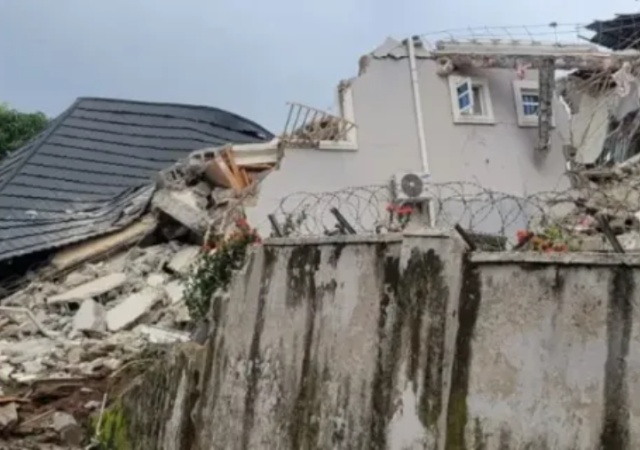
News
Many Trapped As Building Collapses In Kubwa Abuja

KUBWA, (iexclusivenews) – In a heart-wrenching incident that has shaken the Nigerian capital, a two-story residential building collapsed in Abuja on Saturday morning, trapping an unknown number of individuals beneath the rubble.
Let’s delve into the details of the collapse, the ongoing rescue efforts, and the implications for urban safety in the region.

A Sudden Catastrophe
The collapse occurred in a densely populated area of Abuja, specifically on Cupid Road (Sultan Dasuki Way) in Kubwa, adjacent to the well-known Cupid Hotel.
The building’s history is as complex as its current predicament – having previously served as the Al-Hilal Hotel and later as a hospital before being converted into residential apartments.
Timeline of the Collapse:

Early Saturday morning: Residents report hearing ominous cracking sounds
Around 7 a.m.: The building suddenly collapses, trapping occupants inside
Shortly after: Emergency services alerted and begin to arrive at the scene
Rescue Operation Challenges and Progress
The rescue efforts faced significant hurdles from the outset, highlighting the critical need for improved emergency preparedness in urban areas.
Initial Challenges:
- Lack of essential equipment, particularly cranes
Delay in the arrival of heavy machinery, taking over two hours to reach the site
Difficulty in assessing the number of trapped individuals
READ MORE: Adultery: Daddy Freeze’s Appeal Denied Court Upholds N5m Fine
Rescue Achievements:
Despite these obstacles, the dedicated rescue teams have made some progress:
-Two individuals successfully extracted from the debris
-Several residents managed to escape the building on their own
-Survivors rushed to nearby hospitals for immediate medical attention
Survivor Accounts: A Harrowing Experience
One survivor, who chose to remain anonymous, shared her terrifying ordeal with rescue workers. Her account provides a chilling glimpse into the moments leading up to the collapse:
“I woke up around 7 a.m. and heard strange cracking noises as I stepped outside. Instinctively, I knew something was wrong and ran from the building as fast as I could.”
This survivor’s quick thinking likely saved her life, underscoring the importance of being alert to potential structural issues in residential buildings.
Implications for Urban Safety
This tragic event raises serious questions about building safety standards and enforcement in rapidly growing urban areas:
- Structural Integrity: The need for regular inspections and maintenance of older buildings
Building Code Enforcement: Ensuring strict adherence to safety regulations during renovations and repurposing of structures
Emergency Preparedness: Improving the availability and response time of critical rescue equipment
A Call for Action
As rescue efforts continue and the community grapples with this tragedy, it’s clear that urgent action is needed to prevent similar incidents in the future.
Authorities must prioritize building safety, emergency response capabilities, and public awareness to safeguard the lives of urban residents.
The Abuja building collapse serves as a stark reminder of the fragility of our built environment and the paramount importance of stringent safety measures.
As the city mourns those affected by this disaster, it must also look ahead to implement lasting changes that will protect its citizens from future catastrophes.




















